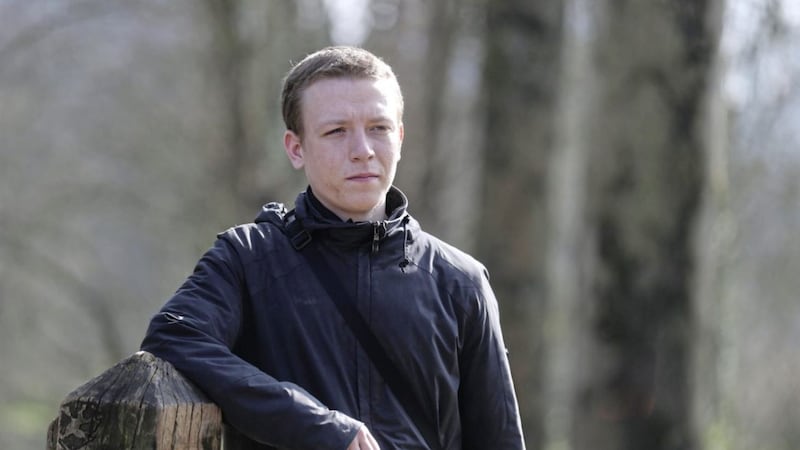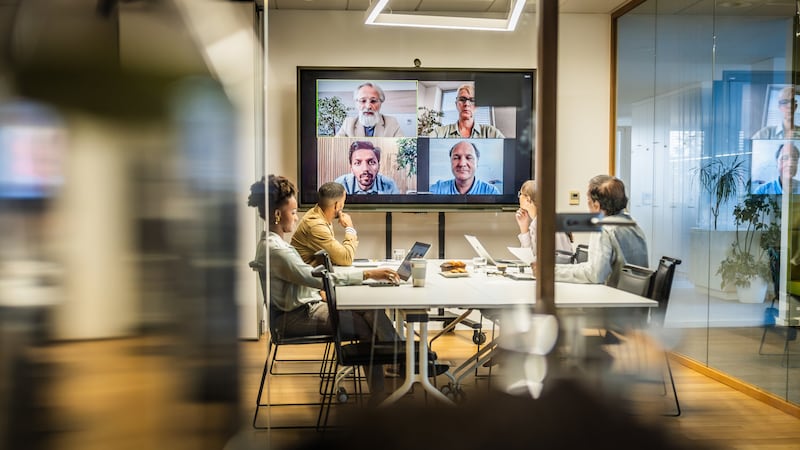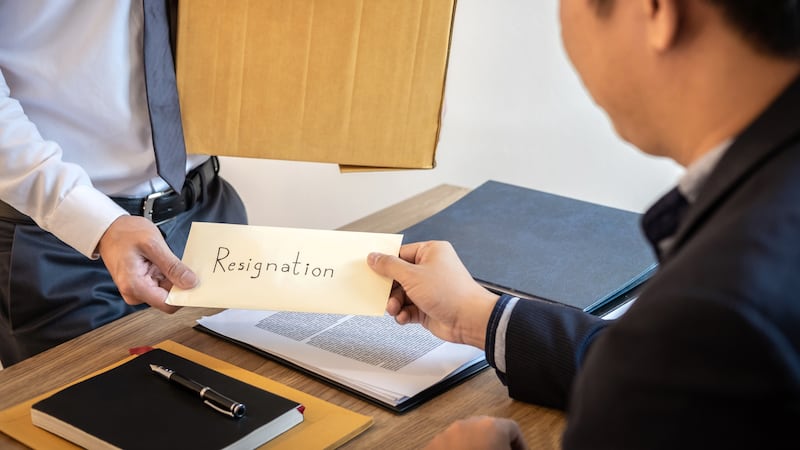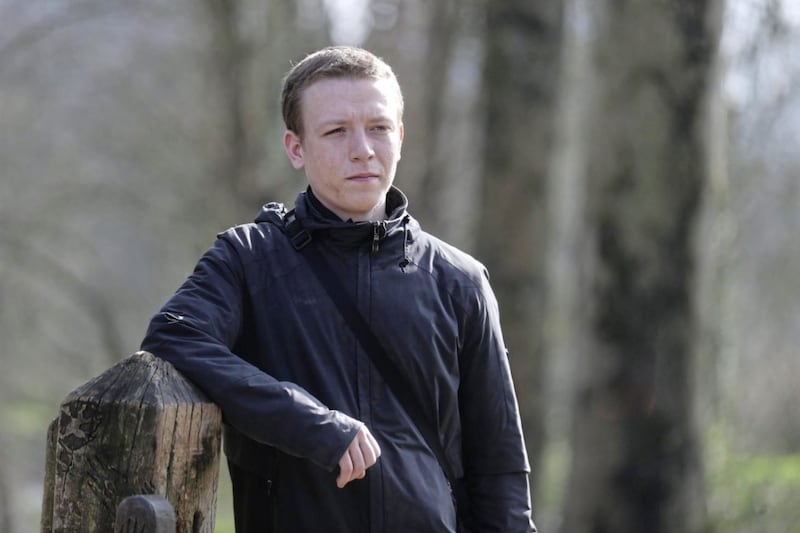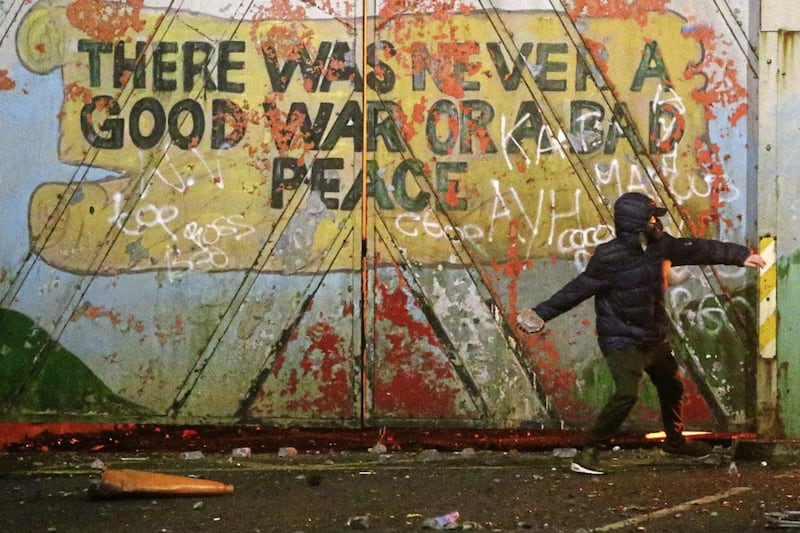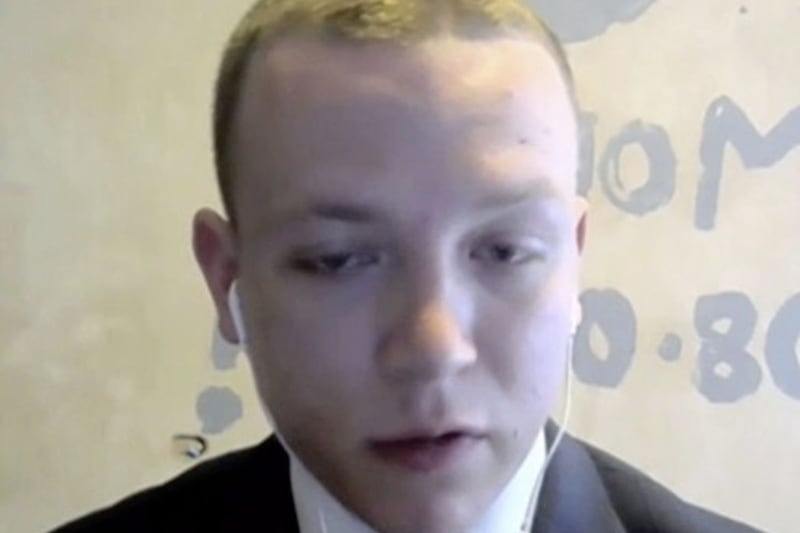A young loyalist who came to prominence after warning that the use of violence to oppose the Northern Ireland Protocol is not “off the table” has said he stands over the remarks almost one year on.
Joel Keys came in for criticism after he made the comments while addressing Westminster’s Northern Ireland Affairs Committee.
He was one of four Loyalist Communities Council (LLC) representatives who gave evidence on the protocol, which puts a border down the Irish Sea, to the committee last May.
The LCC is an umbrella group which represents several loyalist paramilitary factions including the UDA, UVF and Red Hand Commando.
Speaking to The Irish News, Mr Keys, from east Belfast, said he hasn’t “really spoke to” the LCC since his Westminster committee appearance.
Opposition to the controversial protocol has resulted in protests and occasional outbreaks of violence in loyalist areas over the past year.
During the hearing Mr Keys was asked about violence linked to the sea border should the protocol be deemed to be working successfully by both the UK and EU.
Mr Keys replied: “I am not sure if and when violence will be the answer. I’m just saying that I wouldn’t sort of rule it off the table.”
Committee chair Simon Hoare described the response as “incredibly worrying and dispiriting”.
The encounter catapulted the then teenager onto the public stage and he was forced to defend his comments.
Nearly a year on from the media whirlwind that introduced him to the harsh world of politics, the now 20-year-old stands by the comments.
“I have stood my ground, I haven’t been bullied into taking anything back,” he said.
“I have been able to explain what I meant a wee bit more and flesh those wee points out a wee bit more, which has been good.”
Mr Keys believes the current crisis in Ukraine bears out his original remarks.
“I would still say that everything I said at the Westminster committee I stand by and I think we have to look no further than Ukraine at the moment,” he said.
“I don’t think any peaceful protests are going to send the Russians home.
“The Ukrainians have been forced to fight. Now, that’s not to compare our situation to theirs at all.
“There’s an example of where violence has to be used in order to maintain what they have.
“That’s just the point that I was trying to make at that committee.
“So, yeah, that point stands.”
Mr Keys continues to have a high profile on social media and has engaged in dialogue with political opponents over the past 12 months.
“I think for myself as well, recognising the difference between what you know and what you assume has been very eye-opening,” he said.
“There has been a lot of things that we talk about and it’s not necessarily that we disagree, it’s just that we are coming at it from two completely different perspectives.
“As long as you sit down for people for long enough and you ask the right questions you can actually pinpoint where the point of contention is and work through it.
“Even if you don’t come out agreeing you can understand each
other, you certainly don’t come out disagreeing.”
Mr Keys believes he has come to a better understanding of others over the past 12 months and now appreciates that much of what people believe is bound to their cultural background.
“It makes you realise that a lot of the things we think are instilled at birth or inherent in us are actually just learned,” he said.
“It’s just recognising that it is a learned identity, its what I grew up in.
“It helps you appreciate your own identity a lot more and it also helps you respect other people’s.
“For myself its a really interesting journey.”
In recent months the prospect of a united Ireland and the potential for a border poll have been raised by some politicians.
Mr Keys said he has also come to realise there is no set view of what a future united Ireland would look like.
“The united Ireland conversation has actually brought a whole load of new things to my mind so something I think loyalists misunderstand, or is a misconception among loyalists, is that people who support a united Ireland are all on the same side,” he said.
“What I have got from talking to people, it doesn’t seem to be as unified of a movement as loyalists seem to think.
“There seems to be a lot of people who have very different visions of what a united Ireland may or may not look like.”
He said he hasn’t changed his views on the prospect of a united Ireland.
“For me, it hasn’t given me any revelation. I haven’t completely changed my mind on any views I’ve had but it has shown me that we have only had a surface level conversation about these things in Northern Ireland.
“Genuinely, we have only talked about such surface level things, very rarely do we sit down and discuss what would things like this look like or how would that affect Ireland
or what are the implications or ramifications.”
He added that there are “conversations that need to be had” but he remains steadfast in his loyalism.
“Again, I am proud of my loyalist identity and I think at the end of this conversation or at the end of these processes I will still be a loyalist, I have no doubt.”
Asked if he could see himself living in a future united Ireland, the young loyalist said he could not rule it out.
“The way I would frame it is we don’t really know what a united Ireland may or may not look like so to me it seems kind of foolish to rule it out as a possibility or rule out my support for it,” he said.
“Because we simply don’t know what that would look like, it could look like so much different things.”
He also suggested a unified Ireland may accommodate those who identify as British.
“In theory a united Ireland could be one that allows me to be a British citizen still,” he said.
“It doesn’t necessarily have to be one or the other, we could come to a happy compromise.
“It’s a conversation that hasn’t been developed to the point yet where anyone can really support it or rule it out.
“It seems strange to me that people feel so strongly about this because really right now it’s like a slogan – a united Ireland – without any of the details of what that would look like.”
He believes loyalists should discuss the issue.
“I think internally, I think it definitely needs to be talked about more because whenever I speak to loyalists about a united Ireland a very common answer I get is ‘it’s never going to happen’ or ‘people will never vote for it’ or this or that,” he said.
“But I think there’s a real naivety there in that – who’s to say that we are even going to get to vote for it.”
He spoke of his belief that loyalism must be prepared for the prospect of political change.
“Whether or not we vote for it, whether or not it ever comes, I think it would be wise for loyalism to talk about it more,” he said.
“You have to have some back-up plans in place – what’s going to happen if some dodgy deal is made behind closed doors and Sinn Féin are promised this united Ireland, whether that be in the form of a vote or whatever, it’s so hard to predict how these things will go.
“But I think it’s really foolish to have the opinion, ‘ah, it will never happen so I don’t need to speak about it’.
“That seems like such a short-sighted stance to take in my eyes.”
He also said he had formed a view that “the British government doesn’t want us”.
“Now, I don’t care. It doesn’t bother me whether or not they want us,” he said.
“I’m just as British as them whether they like it or not.”
Mr Keys said that despite his views “that doesn’t mean I am ignorant to the fact that this government, Boris Johnson’s government, have shown it’s very possible that we may be pushed out against our will, step by step at a time.”
“If that’s going to happen, if its something outside of our control, why not control what we can control,” he said.
“And we can control how we contribute to the conversation.”
His views on the protocol remain the same and he believes the concerns expressed by loyalists should be taken more seriously by political opponents.
“It’s not just loony bins who oppose it, it’s not just a load of guys who are tied with questionable people or whatever,” he said.
“It is actually something that a lot of people oppose and want to talk about and have issues with and I do think it’s something that we probably could work through if only we were willing to just talk civilly.”
Mr Keys keeps a keen eye on local politics and suggested there is unhappiness with the DUP in loyalist communities.
He said “a lot of people” were “disappointed” at the way in which former party leader Arlene Foster was ousted last year.
“Arlene had, it seems anyway, a good bit of respect even if people think maybe she wasn’t perfect,” he said.
He said senior DUP figures like short-lived former leader Edwin Poots, who succeeded Ms Foster, and current boss Jeffrey Donaldson are disconnected from loyalist
districts.
“With Jeffrey and Poots, people just don’t know them enough around these areas. I mean, I have never met either one of them and I have met a lot of politicians,” he said.
“So, I just think it’s a case of
they are not connected with the communities very much as well as the whole Northern Ireland Protocol stuff, the DUP are facing a lot of blame for that as well.”
Mr Keys believes the DUP could suffer at the polls in May.
“This election strategy of fearmongering and ‘oh, vote for us or they’ll get in’ – people aren’t falling for it any more, people are starting to see through it.”
On his Twitter feed, the young loyalist describes himself as a “democrat” and “future MLA”.
He says he still hopes to launch a political career but remains unclear as to what party to side with.
Although he has spoken with UUP leader Doug Beattie in the past, he is minded to run as an independent when the next assembly term reaches its end.
And he believes he can make a difference.
“I would like to think that if I was in politics, if I am in politics for the next 20 years, the progress we will see in the country in my next 20 years will be much more than the progress we have seen in the last 20 years,” he added.
